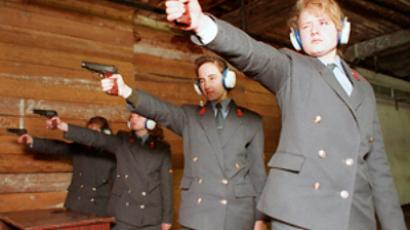Human rights behind bars: activists may get more instruments to help
Public watchdogs monitoring the rights of prisoners in Russia might be entitled to visit jails without a preliminary warning, take pictures or film inside prisons and talk to prisoners and detained unaided.
A respective draft on amendments to the law on the public control of human rights observation in jails has been developed by a specialist group of the Presidential Council on Human Rights, on-line newspaper, gazeta.ru reports. The concept of the bill has recently been approved by a working group on adjusting the law on non-commercial organizations. The group is headed by Vladislav Surkov, deputy head of the Presidential Administration, who is also seen as the main ideologist of the Kremlin.
The bill was devised under the control of a prominent human rights activist, Valentin Gefter. It is planned that discussions on the amendments will be finalized by fall of this year.
If the draft is approved, the prisoners and detainees will get a better chance to have their rights observed and protected, which now, unfortunately, is not always the case.
Among the changes proposed is, for instance, a widening the list of places of custody regulated by the law on the public control. That means that detainees kept in psychiatric clinics and those, for instance, arrested during banned rallies and taken to police stations will receive the same rights to appeal to public watchdogs for help.
Gazeta.ru notes that currently people sentenced to medical treatment are kept in mental hospitals in conditions that are not much different from those in prison. Illegal immigrants awaiting deportation often have no opportunity at all to obtain legal assistance. And there are hundreds of those cases due to the non-stop flocking of migrant workers to Russia from former Soviet republics, many of them not having the proper documents to stay and work in the country.
The composition of public commissions might be changed as well. Currently, among other requirements, the law says that only a Russian citizen aged over 25 who has no previous convictions can join the human rights watchdog. If the amendments are approved, it will be a person aged over 21. Moreover, even those who had their previous convictions expunged will be able to help people behind bars. Yet another novelty suggested is banning former employees of departments of execution of sentences, policemen and other people connected with custody from being members of the public commissions.
At the same time, it might be permissible for doctors, psychologists and other specialists to visit jails within the commissions to get professional information on the conditions the prisoners are living in.
According to the online outlet, initially the human right activists envisaged a clause obliging the commission to warn in advance the administration of establishments of their visits. However, the final version of the draft – a compromise with the opponents – says human rights activists would have to give just ten minutes’ notice to the authorities in charge of the facility they are planning to inspect.
The final, and perhaps most important, improvement would be allowing the human rights watchdog to take photos and film inside the institutions where prisoners are kept. And also unsupervised, unmonitored conversations with prisoners will be permitted.
The appropriate treatment of people who – for one or another reason – have contravened the law is vital for a civilized society. However, sometimes the fact that prisoners are human beings is forgotten.
There are cases reported almost worldwide in which the rights of people behind bars have been violated or even where prisoners are being tortured. Russia is no exception, and stories of prisoners who have been treated badly come to the surface, resonating with the public and making the country’s leadership ponder solutions to the problem.
Among the latest scandals were the deaths of two suspects in prison, both of whom were kept in custody despite poor health. Sergey Magnitsky, Hermitage Capital Investment's tax adviser died in November last year of a heart attack. In April this year, a death of a 53-year-old real estate agent, Vera Trifonova, caused yet another shake-up in Russia’s legal system. Suspected of fraud, she was put into a pre-trial detention center, despite having serious health problems. Several times the investigator of her case was asked to release her on bail so that Trifonova could get proper medical treatment. The requests were ignored and the woman passed away from complications of diabetes.
The high-profile deaths in custody, though, sped up the reaction from the authorities. In May, the head of Russia’s Investigative Committee signed a decree ordering investigators to jail criminal suspects only in the most serious cases, when less strict measures, such as house arrest or restriction to a certain city, are impossible.
It might be a long time before the lawmakers come to any decision on the proposed draft on expanding human rights commissions’ powers, but the foundations seem to have been laid. And that is good news for Russian prisoners. According to the Federal Service of Punishment Administration, as of June 1 this year, 850,800 people remained in custody on the territory of the country.
Natalia Makarova, RT













